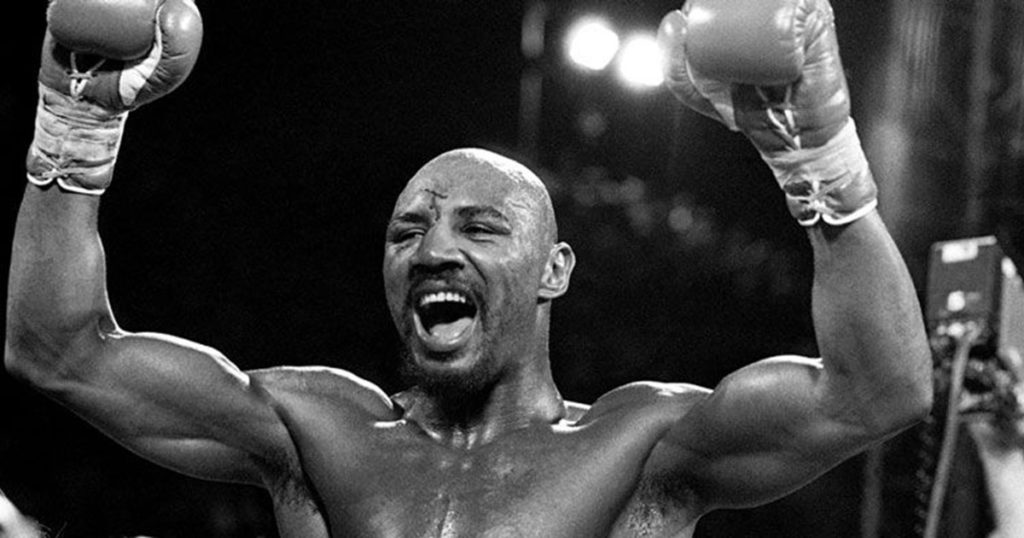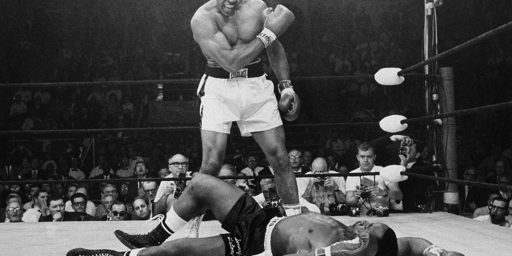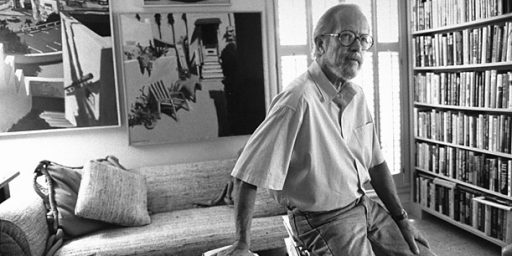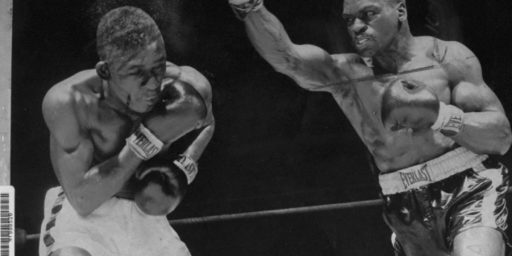Marvelous Marvin Hagler, 1954-2021
An all-time boxing legend is gone.

Before the prime bouts went pay-per-view and the more extreme mixed martial arts made its rise, boxing was among the most popular sports in America and Hagler was among its biggest stars.
CBS (“Legendary boxing champion ‘Marvelous’ Marvin Hagler dies at 66“):
One of the toughest and most beloved boxers of the modern era, former undisputed middleweight champion Marvelous Marvin Hagler died Saturday at age 66.
[…]
Promoter Bob Arum and Top Rank later confirmed the news in a press release.
“Marvelous Marvin Hagler was among the greatest athletes that Top Rank ever promoted. He was a man of honor and a man of his word, and he performed in the ring with unparalleled determination. He was a true athlete and a true man. I will miss him greatly,” Arum said.
A 1993 inductee to the International Boxing Hall of Fame, Hagler made 12 defenses of the undisputed middleweight title he held from 1980 to 1987. The native of Newark, New Jersey, who settled in Brockton, Massachusetts, as a teenager, went on to take part in a pair of the most memorable fights in the sport’s history.
Hagler (62-3-2, 52 KOs), a southpaw who switched stances with ease, stopped Thomas Hearns in the third round of their 1985 middleweight title bout known today simply as “The War.” The fight was instantly hailed as one of the most exciting, violent and dramatic title fights boxing has ever produced.
The final bout of Hagler’s 67-bout professional career remains nearly as memorable as the reigning 160-pound champion finally secured a fight against longtime rival Sugar Ray Leonard in 1987. The 12-round thriller, which Leonard won by split decision, remains one of the most disputed results to date.
Disgusted about the scoring in the Leonard fight, Hagler would never fight again and retired the following year at the age of 34. Hagler immediately moved to Italy, where he spent much of his life after boxing, and pursued an acting career.
A true fighter’s fighter thanks to his ability to box just as good as he punched, Hagler’s calling card throughout a career that began when he turned pro in 1973 was his chin. Not only was Hagler never stopped in any of his three defeats, he was knocked down just once against Juan Roldan in 1984, which Hagler immediately disputed should have been called a slip.
A member of the famed “Four Kings” of the 1980s — a celebrated group of Hall of Fame middleweights that included Hearns, Leonard and Roberto Duran — Hagler also owned a decision win against Duran in 1983.
Hagler went 55-1 as an amateur, including winning the United States National Championship at middleweight in 1973. But he chose to turn pro rather than seek Olympic fame and was forced to take the long road toward gaining respect and riches by being forced to repeatedly prove himself inside the ring.
The fact that Hagler wasn’t as celebrated as his rival Leonard, who won Olympic gold in 1976, helped build a resolve that only made him tougher. Hagler’s first shot at the middleweight title also ended in disputed fashion when he claimed robbery after settling for a split draw against Vito Antuofermo in 1979.
One year later, Hagler would finally have his moment when he traveled to London in 1980 to claim the undisputed middleweight championship by stopping Alan Minter. The celebration proved short lived, however, as Hagler was pelted with trash and debris by the partisan crowd.
Hagler went on to earn Fighter of the Year honors in 1983 and 1985 by the Boxing Writers Association of America. He was also named Fighter of the Decade in the 1980s by Boxing Illustrated.
While “Marvelous” was initially a nickname, seemingly a requirement for boxers of the era, he eventually had it legally made part of his name in 1982.
The cause of death has not been released. Because he was such a star in my youth and I’m now 55, it’s hard to believe he was only 66. That’s awfully young to die, especially for someone of Hagler’s affluence but, as Marcellus Wallace notes, they don’t have an Old Timer’s Day for boxers. It’s a brutal sport that takes its toll.
Yet, as ESPN’s Mark Kriegel notes, he was one of a relative handful of superstars of his sport to walk away on his own terms.
The great fighter retires with his fortune and his faculties intact.
Then he stays retired — resisting the urgings of the promoters, the public and the ferocious power of his own ego, that which made him great in the first place.
It’s boxing’s most unlikely story.
And its happiest.
And it’s Marvelous Marvin Hagler’s, forever.
“When I question myself, as to what the hell was I doing in boxing all these years, I think of Marvin Hagler,” Bob Arum said Saturday, shortly after being informed of Hagler’s passing. “He was the most loyal, dedicated fighter I ever promoted.”
That’s from a man with 55 years in the business, a guy who couldn’t talk Hagler into one more comeback. Not for lack of trying, though, and no matter the price.
Arum recalls being at Caesars Palace in the late 1980s. Muhammad Ali was there. Tommy Hearns was there. So were Roberto Duran and Ray Leonard, about a year after Leonard won his controversial decision over Hagler.
“Tell Marvin we should do it again, a rematch,” Leonard told Arum. “We’ll make a fortune. Tell him.”
As Leonard’s logic was unassailable, Arum delivered the message.
Hagler glared down at the promoter. “Tell Ray to get a life,” he said.
No aspersions to the great Leonard, but that’s the hardest part. For fighters, fighting is the easy stuff. Not fighting is harder. Having a life, being happy and healthy and wealthy enough to enjoy yourself after the fighting, is the most difficult proposition of all. And when you assess Hagler’s place in boxing history — the ever-disputed decision to Leonard, the less ambiguous decision over Duran, the stoppages of Alan Minter, Vito Antuofermo, Hearns (watch on ESPN+) and John Mugabi — that should count as his greatest victory.
Indeed, he was already past his prime—and knew it—when he faced “Sugar” Ray Leonard in that last bout and had to be cajoled into that one.





He was a legend. And from what I’ve been told from people who met him, a first class person in real life as well. RIP
As I recall it, he lifted the Sports Media’s attention from a fixation on Heavy Weights where it seems it had always been. By focusing on lighter weight divisions we learned to appreciate the sporting nature of boxing which once billed itself as ‘the art of self-defense’.
RIP Marvin.
The Boston Globe posted a death notice yesterday that quoted Hagler’s wife;
Sixty-six is young, he died at home and there has been no comments from friends about his ongoing medical condition. Most, if not all boxers suffer from traumatic brain injury and one wonders what effect TBI might have played in his death.
The 80’s middleweights, Hagler, Leonard, Hearns and Duran were boxing last hurrah. Four great athletes all at or near their prime in the same decade. That class might be viewed as existing in the shadow of the 60’s and 70’s heavyweights, Ali, Foreman and Frazier, but there is a good argument that those middleweights stood alone in their greatness.
@JohnMcC: @Sleeping Dog: The heavyweight division was pretty thin at that point. Larry Holmes was great and defending the title an inordinate number of times but was always in the shadow of what Ali had been. And he was followed by a long list of forgettables until Mike Tyson showed up. And he was viewed more as a brute than a boxer.